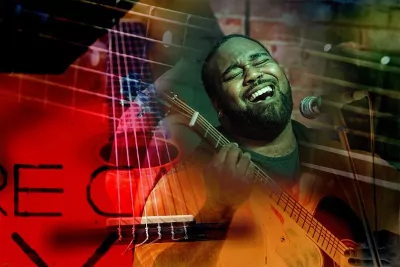The vibrating strings of the guitar add a soul-stirring melody, poignant lyrics, and emotive performances to R&B and soul music. The guitar, as a conduit of emotion and a source of rhythm, is a key component of the genre’s trademark sound. In this article, we’ll look at the guitar’s intricate and vital function in R&B and soul music, as well as how it contributes to the genre’s profound emotional connection with listeners.
The ability to portray emotions in their most raw form is at the heart of R&B and soul music. The guitar acts as a melodic narrator, delivering expressive notes that emphasize the lyrics’ sentiment. The guitar’s job in R&B and soul music is to elicit an emotional response in listeners, letting them experience every line on a profound level, whether through soft arpeggios or soulful licks.
R&B and soul music frequently rely on rich harmonic progressions to establish the groundwork for the genre’s emotional weight. The guitar’s contribution to these progressions is critical, providing lush and expressive chord voicings that serve as a canvas for singers to paint their stories. The guitar provides the harmonic backdrop that supports the emotional depth of the genre, from smooth and jazzy chords to gospel-inspired progressions.
Learn to Play the Guitar
The heartbeat of R&B and soul music is rhythm, and the guitar is an essential part of the genre’s rhythmic fabric. The guitar’s rhythmic virtuosity sets the tempo for the music, prompting listeners to tap their feet and sway to the beat, whether strumming muted chords in a laid-back R&B ballad or supplying syncopated and funky rhythms in an exuberant soul piece.
Guitar solos in R&B and soul music are more than just technical demonstrations; they are emotional conduits through which guitarists can vent their innermost thoughts. Guitarists express emotions that words cannot express through bending, vibrato, and elegant phrasing. These solos are frequently used as climactic moments in the music, giving an extra layer of intensity to the already intense tale.
The guitar is frequently a supportive partner to the lead vocalist in R&B and soul music. Guitarists offer depth and richness to vocal performances without overpowering the singer’s delivery. The rhythmic comping and nuanced fills of the guitar contribute to the genre’s broad and lush orchestration.
The guitar’s involvement in R&B and soul music varies depending on the subgenre:
Neo-Soul: Known for its combination of R&B, soul, and jazz, neo-soul frequently contains sophisticated guitar playing that complements the genre-bending aspect of the music.
Contemporary R&B: The guitar’s position in modern R&B can range from traditional chordal progressions to electronic-infused production, demonstrating its adaptability to changing musical trends.
The guitar’s strings resonate with the darkest recesses of human emotion in R&B and soul music. The guitar adds a soulful dimension that envelops listeners in a sonic hug with its lyrical narrative, harmonic depth, and rhythmic skill. It acts as a channel for emotion, communicating joy, heartbreak, and all in between. As the notes of the guitar intertwine with the voices singing tales of love, grief, and self-discovery, it becomes evident that in R&B and soul music, the strings do more than just play; they pour out the essence of the human experience.
Image by Gerd Altmann from Pixabay

